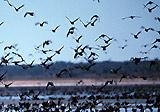Floods cause feeding and breeding frenzy
Floods across large parts of western Queensland will produce a bird bonanza lasting six to nine months, according to UNSW researcher Professor Richard Kingsford.
Floods across large parts of western Queensland will produce a bird bonanza lasting six to nine months, according to UNSW researcher Professor Richard Kingsford.

Vast flocks of water birds from across Australia will soon start gathering for a long-awaited feeding and breeding frenzy sparked by flooding in western Queensland.
The floods will produce a bird bonanza lasting six to nine months, says UNSW Professor of Environmental Science, Richard Kingsford.
"Up to 50 species of water birds from the dry eastern areas of the state will be on their way to the Georgina/Diamantina floodplain to take advantage of an inevitable boom in the supply of insects, invertebrates, frogs, crustaceans and fish," Professor Kingsford says.
"The creatures in this region have been hanging out for this big flood - there will be a frenzy of breeding activity among birds such as pelicans, spoonbills and ibis because there will be an absolute smorgasbord in the available food supply.
"Somehow they know there's action happening out there, and they'll move in very quickly."
This flood is of particular importance because much of south-eastern Australia has been so dry in recent years, due to the severity of the drought and human regulation of rivers.
Professor Kingsford has for the past 20 years done aerial surveys of waterbirds in Australia's arid inland wetlands and desert rivers, which swing between a "boom and bust" cycle of flood and drought. His most recent survey, last October, confirmed that the bird life and ecology of these inland regions have been ravaged by drought.
In his recently published book, Ecology of Desert Rivers, Kingsford revealed how birds and other organisms survive and thrive in an environment of such extreme swings in conditions. He reveals how human interventions, such as the creation of dams, is affecting desert, rivers and the animals and plants that depend on them for survival.